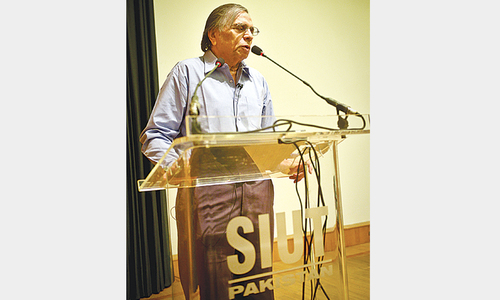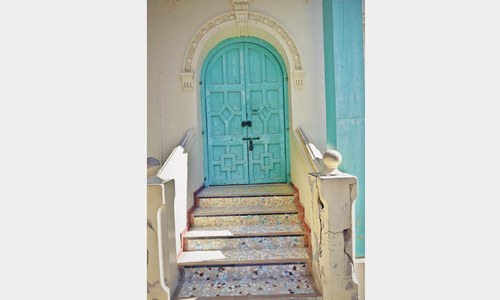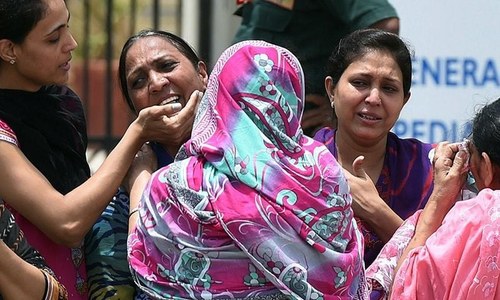Prince Shah Karim Al Hussaini, the 49th Imam of the Shia Ismailis, celebrates 60 years today since he inherited the leadership of his community from his grandfather and became the Aga Khan.
Prince Karim is best known for a life dedicated to social services for some of the most underprivileged communities in Asia and Africa.
He is the founder and chairman of the Aga Khan Development Network (AKDN), renowned around the globe for its work in providing quality healthcare, education, revitalisation of cultural heritage, safeguarding the environment, and uplifting of marginalised peoples through community and economic development.
As part of the buildup to his Diamond Jubilee, the Aga Khan gave an exclusive interview to a select group of journalists from different countries, including Dawn.
In his introductory comments, the Aga Khan laid out what he calls “the parameters within which religious institutions in the Muslim world can work,” namely that of trying to “improve the quality of life of the people of the community and those amongst them where the community lives, [by] eliminating unfairness, fraud, and giving families the opportunity to think that their future generations can live in an improved society.”
He outlined the need to “use material resources for these purposes which are required by the Muslim faith” and said that, for the Jubilee year, he hopes to lead his community to “identify various resources in the civil society in the countries in which [they] are engaged and support them in their mandate.”
#####AKDN spends US$ 925 million annually on non-profit social and cultural development activities. It operates more than 200 health care institutions, 2 universities spanning 6 countries, and 200 schools and school improvement programmes in some of the most remote and poorest parts of the developing world.
The Aga Khan went on to say that “we need to accept today that any institution, any country, which has a pocket of weakness, is an institution or a country at risk” and that “we need to concentrate on eliminating the risk and the damage they have done to these countries.”
The leader of the Shia Ismaili community stressed that the basis we should be using to evaluate development initiatives is “public good,” for as long as we do that “we should be on the right side of logic.” In this regard, the Aga Khan was critical of the whole banking system that is “directed toward the notion of profit rather than the notion of social support.”

I asked him to address South Asia in particular, to which he replied that the “financial institutions ought to be a great deal more open to social support needs.” For example, “is microcredit doing the job that people hoped it would be doing?” he asked.
“My view is no, it’s not because microcredit helps certain demographics but it doesn’t affect the whole of the economy of a given country. There are many financial needs which are not addressed by financial institutions today, and I’m talking particularly about the medium-sized enterprises that are definitely, in my view, underfunded.”
Above all, however, the “major threat” facing South Asia and much of the developing world is climate change, which needs to be “looked at with great care to address the particular causes of the situation.” Tackling climate change is the “first issue” the Aga Khan said he would look at especially since he says he’s not “convinced that [much] is happening [in this regard] at the present time.”

Addressing climate change and providing access to economic resources have to be part of the plan to alleviate poverty, which has to be the “first priority for South Asia.”
Climate change is directly linked to the “quality of life,” especially “in the developing world” where there are a “number of situations where there’s not sufficient sustenance for ensuring an acceptable quality of life.”
The Aga Khan said that his “sense is that there has been very little global thinking about how we deal with issues of pollution, water availability, issues of unstable earth – all issues that are, in a sense, predictable.”
He said that he has “been more than worried about situations where everybody knew and have known for decades that they were living in high risk and nothing was done about it.”

An equally integral component of the Aga Khan’s mandate is pluralism. He emphasised the fact that the societies where his institutions work are “pluralistic and they have been pluralistic for many, many centuries.” He deplored the various “forces at play which have tended to separate these societies in separate ethnic and religious groups.”
When I inquired as to what role can Islam play in promoting social peace, especially in a region like South Asia, the Aga Khan was unequivocal: “Social ethic is a strong principle in Islam and I think that Muslims would be well advised to respect that as a fundamental ethic of our faith and to live by that, which means that we have to be what I would call an empathetic society, a welcoming society, peaceful society, a generous society.”

Commenting on the situation of Muslims in the West, the Aga Khan insisted that it’s “absolutely incorrect to try to move Islam out of the context of global monotheism,” since “Islam is an Abrahamic faith, it’s a monotheistic faith and most of the principles of Islam equate with the principle of other major global monotheistic faiths.”
“The world we seek is not a world where difference is erased but where difference can be a powerful force for good, helping us to fashion a new sense of cooperation and coherence in our world and to build together a better life for all.”
He also pointed out that a “large percentage of the immigrants who enter the Western world come from the Muslim world. It’s an issue that needs to be dealt with empathy and care, and where it has been dealt with empathy and care – and I would give Canada as an example – you can see that the results have been welcomed.”
In his final remarks, the 80-year-old avowed that his institutions and partners would keep working to find "solid solutions" to the problems he highlighted. The Diamond Jubilee, he said, is a "remarkable opportunity to come together" to achieve these goals.














































